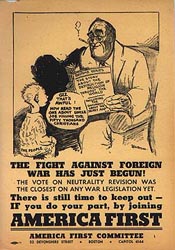by Mark Tarses
In 1939, a group of 6 Yale law students formed a campus organization to oppose American intervention in the war already raging in Europe. They called their group The America First Committee. (Although many people assume that The America First Committee was formed in the mid-west by poorly educated rednecks, in fact, The America First Committee was formed on the Yale campus by some very smart and well educated guys.)
4 of the 6 founding members of The American First Committee went on to become very powerful people: Potter Stewart (later a Supreme Court judge), Sargent Shriver (later a member of the Kennedy family and JFK administration), Gerald R. Ford (later President of the U.S.), and Kingman Brewster, Jr. (later a professor of law at Harvard, U.S. ambassador to England, and President of Yale University itself.)
The America First Committee held the view that America should build up its national defenses, but the Committee strongly opposed U.S. aid to Britain. They argued that if the U.S. gave money, food, or weapons to Britain, that this aid would eventually lead to American involvement in the war.
The America First Committee grew very quickly. Within months, hundreds of chapters of The America First Committee opened up across the U.S. Hundreds of thousands of Americans either joined the Committee or attended regular meetings.
Charles Lindbergh was a fervent supporter of the America First Committee and spoke often at their meetings and on the radio on behalf of the Committee.
The America First Committee quickly emerged as the major political force in United States opposing aid to Britain. While most of the founding members of The American First Committee were patriotic Americans, for obvious reasons, the Committee also attracted a lot of people to it who joined simply because they were hoping Hitler would win the war: American Nazis, anti-Semites, White Citizen Councils, the Ku Klux Klan, England-haters, Mussolini supporters, etc. (A fairly obnoxious crowd!)
After Pearl Harbor was attacked, and the U.S. was in the war itself, many America First Committee leaders were arrested and convicted for treason, sedition, and sabotage. The American First Committee died as quickly as it was created.

Franklin Roosevelt (a Harvard graduate) was the leading opponent of The America First Committee. FDR held the view that Hitler was a megalomaniac bent on world conquest, and that Hitler meant it when he said "Today Germany, tomorrow the world." FDR gave England as much military aid as possible within the limits of the law (and whenever he could get away with it, FDR gave even more than that.)
Fortunately, this did not become a clear-cut Republican vs. Democratic issue. The majority of the leaders of the Republican Party saw that Hitler was a real threat to the U.S. Their view was best articulated by the Republican candidate for President in 1940, Wendell Wilkie. Wilkie supported U.S. aid to England. He shared FDR's view that while U.S. aid to England did risk war with Germany, if Hitler won his war with England and gained control of the British Empire and British Navy, the U.S. would find itself in a militarily untenable position.
Winston Churchill said that he feared the America First Committee more than he feared Hitler. Churchill often told people, both publicly and privately, that he was absolutely certain that if the America First Committee had succeeded in ending U.S. aid to Britian, Hitler would have won the war.
Some of the early leaders of The America First Committee are still alive. None of them likes to talk about his connection with The Committee. When Gerald Ford is interviewed about his role in founding The America First Committee, he changes the subject. Sargent Shriver would not talk about it either. During the years that Kingman Brewster, Jr. was President of Yale University, no mention of his role in the America First Committee ever appeared in any Yale publication. At Yale alumni get-togethers, the former leaders of The America First Committee never meet. They have no Yale alumni organization. This is still a huge embarassment for most of them.
(In case you were wondering, I did not go to either Harvard or Yale. I went to the University of Maryland.)